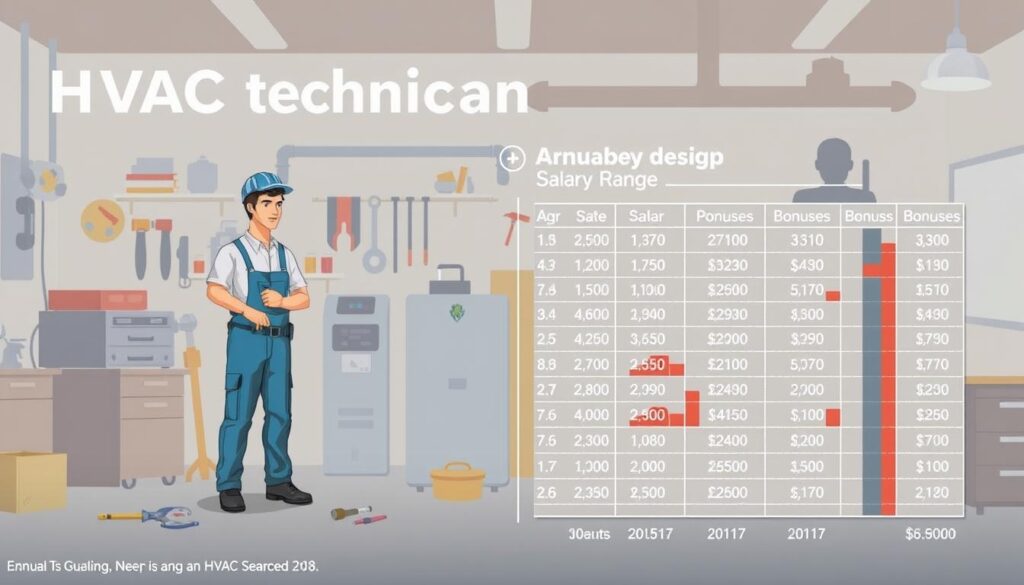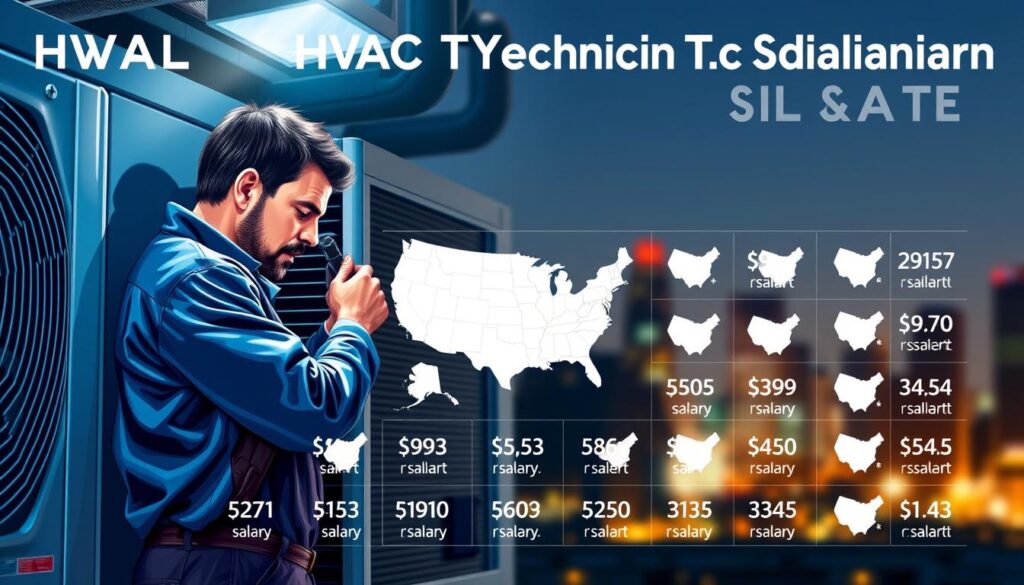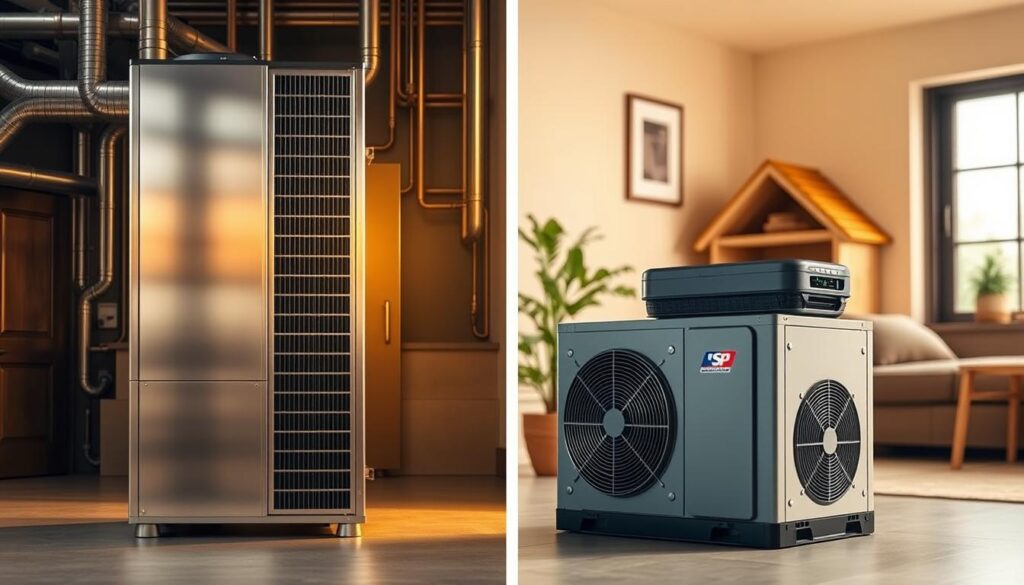Affiliate Disclosure
HVAC Guide Guys is a participant in the Amazon Services LLC Associates Program, an affiliate advertising program designed to provide a means for sites to earn advertising fees by advertising and linking to Amazon.
How Much Does HVAC Make Annually? Ever thought about a career in HVAC? It’s not just about fixing air conditioners. It’s a path to financial success.

Looking into HVAC technician salaries, you’ll find a field with great earning chances. Technicians make between $46,000 and $68,000 a year. Your salary can grow with experience, specialization, and where you work.
Your salary as an HVAC pro depends on several things. From starting jobs to specialized roles, there are many ways to make a good living. This career keeps you cool, both financially and literally.
Key Takeaways
- HVAC technicians earn a median annual salary of $50,590
- Hourly wages average around $29.00
- Salary increases with experience and certifications
- Where you work greatly affects your pay
- This career offers a stable income with growing demand
Table of Contents
Understanding HVAC Technician Career Opportunities
The HVAC industry is full of exciting career paths for those who love technical skills and steady work. With technology getting better and energy saving becoming more important, HVAC jobs are growing. This makes it a great choice for many professionals.
Starting your HVAC career can take several educational paths. These paths prepare you for a fulfilling job. Knowing what you need to get started and how you can grow is key to success in this field.
Entry-Level Requirements and Qualifications
To start your HVAC career, you’ll need:
- High school diploma or equivalent
- Technical training from a vocational school
- Completion of an apprenticeship program
- State-specific licensing requirements
Career Path Development Options
HVAC professionals can move up through different career levels:
- Apprentice Technician
- Journeyman HVAC Technician
- Master HVAC Technician
- HVAC Systems Manager
Industry Growth Projections
The U.S. Bureau of Labor Statistics says HVAC jobs will grow a lot. Here’s what the future looks like:
| Year | Projected Job Growth | Estimated New Jobs |
|---|---|---|
| 2023-2033 | 9% | 14,700 |
Investing in HVAC training can lead to a stable and lucrative career. There are many opportunities for growth and higher earnings.
Explore Our HVAC Shop
Looking for top-rated HVAC tools, parts, and accessories? Visit our shop and find the perfect solution for your needs.
Visit the ShopNational Average HVAC Technician Salary Overview
Knowing the national average for HVAC technician pay can guide your career. The median salary is $50,590, showing a good income in this field.
Your salary can change a lot based on several things:
- Where you live
- How long you’ve worked
- Your special skills
- The industry you work in
The salary range for HVAC pros is wide. The lowest 10% make about $31,000 a year. But, the best can earn up to $80,000. This shows there’s room to grow and get better in the HVAC world.
Looking at salaries by percentile gives a clearer view:
| Percentile | Annual Salary |
|---|---|
| 10th Percentile | $31,000 |
| Median | $50,590 |
| 90th Percentile | $80,000 |
Technological progress and the need for more energy efficiency are creating more chances in HVAC. As you improve your skills and gain more experience, you’ll likely earn more. This makes HVAC a great career for those into technical trades.
Explore Our HVAC Shop
Looking for top-rated HVAC tools, parts, and accessories? Visit our shop and find the perfect solution for your needs.
Visit the ShopHow Much Does HVAC Make Annually Across Experience Levels
Understanding hvac career earnings means looking at how salaries change over time. The HVAC field offers good financial growth as you get more experience and skills.
Your earnings in the HVAC field change a lot as you move up in your career. Let’s see how much HVAC technicians make each year at different experience levels.
Entry-Level HVAC Technician Earnings
At the start of your HVAC career, you can expect to earn about $45,760 a year. Several things affect your starting salary, including:
- Where you live
- Your initial training and certifications
- The demand for HVAC workers in your area
- Who you work for
Mid-Career Compensation
As you get more experience and improve your skills, your earnings will go up. Mid-career HVAC technicians can make around $57,512 a year.
“Experience is the best teacher in the HVAC industry, and it directly translates to higher earnings.” – HVAC Industry Expert
Senior Level Income
Those with 6-9 years of experience can earn a lot. Senior HVAC technicians usually make about $68,286 a year. This shows their expertise and specialized knowledge.
| Experience Level | Annual Salary | Hourly Rate |
|---|---|---|
| Entry-Level (0-2 years) | $45,760 | $22.00 |
| Mid-Career (3-5 years) | $57,512 | $27.65 |
| Senior Level (6-9 years) | $68,286 | $32.83 |
Pro tip: Keep learning and getting more certifications to grow your salary faster in the HVAC industry.
Explore Our HVAC Shop
Looking for top-rated HVAC tools, parts, and accessories? Visit our shop and find the perfect solution for your needs.
Visit the ShopTop-Paying States for HVAC Technicians

Exploring hvac technician salary opportunities shows some states offer great pay. Knowing where HVAC contractors earn the most in the U.S. can boost your career.
The top three states for hvac contractor pay are:
- Alaska: Leads with an impressive annual salary of $75,660
- Massachusetts: Offers competitive wages at $73,300 annually
- New Jersey: Provides substantial compensation around $70,500 per year
These states have high earnings due to unique factors. Alaska’s extreme climate, Massachusetts’ dense cities, and New Jersey’s strong industries drive up demand for HVAC skills.
By choosing to work in these areas, you can earn more. Local economy, population density, and industrial needs affect hvac technician salaries.
Professional tip: Consider relocation opportunities in these states to maximize your income.
While high salaries are tempting, research local rules, living costs, and job competition before moving. Each state has its own challenges and chances for HVAC technicians looking to grow.
Salary Variations by Metropolitan Areas
HVAC worker annual income changes a lot based on where you work. The place you live affects your salary a lot. Metropolitan areas have big differences in pay.
Knowing about these salary changes helps HVAC workers make better choices. Your earnings can go up or down a lot. This depends on whether you work in a city, suburb, or rural area.
Urban vs. Rural Pay Differences
Urban areas usually pay HVAC technicians more. There are several reasons for this:
- Living costs are higher in cities.
- Urban areas have more complex HVAC systems.
- There’s a bigger need for skilled technicians.
- There’s more commercial and residential building.
Cost of Living Adjustments
Your salary can change based on local economy. Cities like San Francisco and New York pay more. This helps cover the high cost of living.
Local Market Demand Impact
Local market conditions affect HVAC worker salaries a lot. Things like climate, industrial growth, and construction trends play a big role.
Regional economic health determines HVAC compensation more than many professionals realize.
For example, technicians in places with extreme weather or fast urban growth make more. This is compared to areas with mild climates.
Explore Our HVAC Shop
Looking for top-rated HVAC tools, parts, and accessories? Visit our shop and find the perfect solution for your needs.
Visit the ShopCommercial vs. Residential HVAC Salary Comparison

When looking at hvac installer income, it’s key to know the difference between commercial and residential HVAC. Each sector has its own path and salary range for HVAC pros.
Commercial HVAC techs usually make more because of the complex systems they work with. Your income can change a lot based on where you focus your skills.
- Commercial HVAC systems are more complex and need advanced skills
- Residential work is simpler, with smaller installations
- Having specialized knowledge can increase your earnings in both areas
| HVAC Sector | Average Annual Income | Complexity Level |
|---|---|---|
| Commercial HVAC | $65,000 – $85,000 | High |
| Residential HVAC | $50,000 – $70,000 | Medium |
Your HVAC career path depends on the specialization you choose. Commercial HVAC needs more training and certifications, leading to better pay.
To earn more, aim to be good at both commercial and residential HVAC. Keep learning and improving your skills. This will help you earn more in this fast-changing field.
Impact of Certifications on HVAC Income
Certifications can greatly increase your earnings as an HVAC technician. They show you’re skilled and dedicated to your work. This makes you more attractive to employers.
Knowing which certifications to get is key to making more money. Each one has its own benefits in the competitive HVAC job market.
EPA Certification Benefits
The EPA 608 Certification is essential for HVAC techs. It shows you can work with refrigerants safely and legally. Having this certification can lead to:
- Higher starting wages
- More job opportunities
- Increased credibility with clients
NATE Certification Value
North American Technician Excellence (NATE) certifications prove your technical skills. They can boost your earnings by:
- Showing you have advanced knowledge
- Qualifying you for specialized roles
- Potentially increasing your hourly rate
Additional Specialty Certifications
Getting more certifications can open up new earning opportunities. Consider getting credentials in:
- Energy efficiency technologies
- Commercial HVAC systems
- Advanced refrigeration techniques
Investing in certifications is a smart way to increase your earnings in HVAC.
Overtime and Bonus in HVAC
HVAC technicians can earn more by working overtime and getting bonuses. Knowing about these extra ways to make money is key to understanding their annual income.
Overtime in HVAC changes with the seasons and urgent needs. Summer and winter are busy times, giving technicians a chance to earn more. They get 1.5 times their regular pay for extra hours.
- Summer emergency AC repairs
- Winter heating system installations
- Commercial project deadlines
- Extended service calls
Bonuses in HVAC pay can come from:
- Performance bonuses for happy customers
- Safety incentives
- Referral bonuses
- Money for being productive
Smart technicians can make more by improving their skills, serving customers well, and keeping up with new tech. Some pros say they earn 20-30% more from overtime and bonuses.
Pro tip: Being an expert in complex HVAC systems can really boost your overtime and bonus chances.
Explore Our HVAC Shop
Looking for top-rated HVAC tools, parts, and accessories? Visit our shop and find the perfect solution for your needs.
Visit the ShopBenefits and Additional Compensation
HVAC workers get more than just a salary. They enjoy a range of benefits that boost their annual income. These perks can greatly improve job satisfaction and financial stability in the HVAC field.
Looking at the total pay for an HVAC worker, we see more than just a yearly salary:
Health Insurance Packages
Top HVAC employers offer great health insurance. This adds a lot of value to your package. You can expect:
- Medical coverage with low deductibles
- Dental and vision insurance
- Prescription drug plans
- Preventative care options
Retirement Planning Options
Long-term financial planning is also part of the deal. Many employers have competitive retirement plans:
- 401(k) matching programs
- Employer-sponsored retirement accounts
- Pension plan opportunities
- Investment matching up to certain percentages
Vehicle and Tool Allowances
HVAC techs also get extra pay for tools and travel:
- Monthly vehicle maintenance stipends
- Tool replacement and purchase reimbursements
- Mileage compensation for work-related travel
- Equipment upgrade funds
These benefits can really up your total earnings. They make HVAC careers both lucrative and secure.
Conclusion
The HVAC industry is full of exciting opportunities for growth and financial stability. Your income as an HVAC installer can vary a lot. This depends on your experience, where you work, and your special skills.
Starting out, you can earn good money as you gain experience. As you move up, your salary will grow. This shows how much you know and how hard you work.
Knowing what affects your pay is key. Getting certified, like EPA and NATE, can really boost your earnings. Where you work and what kind of systems you work on also matters a lot.
The job market for HVAC pros is strong and keeps growing. This is great for those who want to improve their skills and learn more. It’s a field that’s always changing, with new tech and ways to work.
Staying up-to-date with HVAC trends can lead to better jobs and higher pay. By always learning and improving, you’ll have a rewarding career. You’ll also help keep buildings safe and comfortable.
In the end, HVAC is more than just a job. It’s a career with good pay, varied work, and the chance to make a real difference. By focusing on your skills and understanding the market, you can have a fulfilling and profitable career in HVAC.

